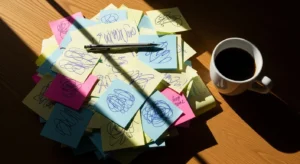
Essential Mindsets: The “Thought Tools” Behind the System
A perfect system in Notion and a disciplined set of rituals will only take you so far. The most significant breakthroughs in focus and clarity come from shifting your underlying mindset. The way you think about your work, your distractions, and your own capabilities is the software that runs on your mental hardware. Here are three crucial “thought tools” to cultivate alongside your second brain.
Reframe Perfectionism as “Good Enough for Now”
Perfectionism is the enemy of progress. It’s the voice that tells you not to start because you don’t have the perfect plan, or not to capture an idea because it isn’t fully formed. This mindset creates immense friction and leads directly to procrastination. Your second brain is the perfect training ground for combating this. Its primary purpose is not to be a pristine, perfectly organized masterpiece. Its purpose is to be a functional, messy, and useful extension of your mind.
Adopt the mantra of “good enough for now.” When an idea strikes, capture it imperfectly. Use bullet points, fragmented sentences, or even a voice note. The goal is to get it out of your head and into your trusted system. When starting a project, create a rough outline instead of trying to write the perfect first sentence. You can always refine, edit, and organize later. Giving yourself permission to be imperfect lowers the stakes and makes it infinitely easier to start and maintain momentum.
Design for Less Friction: Make Focus the Easy Choice
We often believe that focus is a matter of pure willpower. We try to force ourselves to resist distractions through sheer grit. This is an exhausting and often losing battle. A more effective approach is to accept that willpower is a finite resource and instead design an environment where the focused choice is the easy choice. This is about reducing friction for good habits and increasing friction for bad ones.
How does this apply to your second brain? During your Shutdown Ritual, create the Notion or Evernote page you’ll need first thing in the morning. Title it and add a few bullet points. This reduces the “blank page” anxiety and makes starting tomorrow’s work almost effortless. On the flip side, increase the friction for distractions. Log out of social media accounts at the end of the day. Move distracting apps to a folder on the last screen of your phone. Turn off all non-essential notifications. Each small barrier you create gives you a moment to pause and choose your attention deliberately, rather than reacting on autopilot.
Script Your Reset: What to Do When You Get Derailed
No matter how perfect your system is, you will get distracted. A notification will slip through. An urgent thought will derail you. A colleague will interrupt you. This is not a failure; it is a certainty. The difference between a focused person and a distracted person is not that one never gets distracted. It’s the speed at which they recover.
To do this, you need a simple, non-judgmental reset script. The moment you realize you’re off-task—scrolling a news site, checking an irrelevant email—don’t beat yourself up. Shame and guilt only waste more mental energy. Instead, calmly say to yourself: “Okay, I got distracted. That’s normal.” Then, state your intention: “I am now closing this tab and returning to my report.” This two-part script acknowledges the reality without judgment and gently redirects your attention. It’s a small act of self-compassion that makes recovery quick and painless, preventing a minor distraction from spiraling into a completely derailed afternoon.





